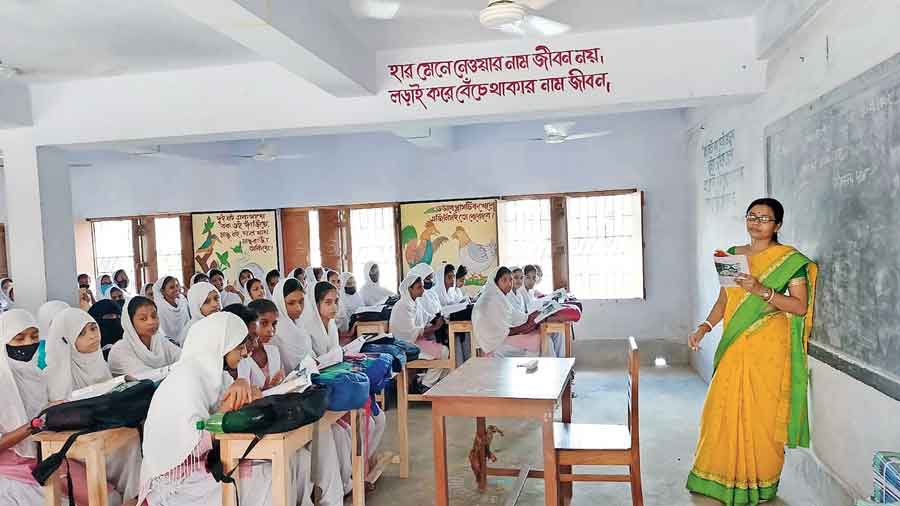A girls’ madrasa in Murshidabad has started Class XI this year and 235 students have already taken admission, validating that opportunities propel aspirations.Many of these girls would drop out of school after Madhyamik (Class X) because their parents were not keen to send them to a school far away from where they lived, said the headmistress.
The Class XI and XII at Debkunda Sk. Abdur Razzak Memorial Girls High Madarsah in Murshidabad’s Beldanga block got the affiliation from the state council of higher secondary education this year.
The first batch of students will pass out in 2024.“We would see girls quitting studies after Class X. At least if we have XI and XII, we can get them back to school and prepare them for the next level,” said headmistress Murshida Khatun.
“Unless we create scope for them and give them access, how can we get them to school?”Khatun said even last year a section of students quit studies after Madhyamik.
The students get engaged in household duties and some get married.Khatun said that the demand for higher secondary was mostly from mothers who want their daughters to study — something that they could not do.“But if a school is too far off they cannot do much. On many occasions, it is the mothers who convince the fathers to send their daughters to school,” said Khatun.
Sabir Ahamed, who has experience working for girls’ education and health in several Bengal villages as national research coordinator, Pratichi India Trust, said: “If there is no access there will be deprivation.”
Ahamed said that when girls are at home there is also a propensity to get them married off. Extended families or neighbours often push the parents to get the daughters married because they are sitting at home, he said.“We have seen a change when girls from Muslim families have gone to school. There has been a change in the mindset of mothers who have become more aspirational. When they see girls from similar economic households going to school on cycles, they too want their daughters to go. That is what access does,” Ahamed said.In a remote place, girls still have to face taunts when they travel, something that parents want to protect them from.
“The parents feel secure sending them to a school where they have studied,” said Khatun.
The number of students seeking admission proved the need for a higher secondary school in the area, said a school official.Class XI student Sanya Mirza said it would have been difficult for her to continue her studies had it not been in the same institution.“We were hearing about this for a long time and thankfully it started.
The other school is at least half an hour from my home and I would not have been able to go,” said the 17-year-old.
Over 200 students passed Madhyamik from the school this year and 235 students took admission in Class XI.
The number includes students from other schools.A section of students come from financially deprived families and the pandemic has only aggravated their problems.Many students struggled to continue their studies and faced a crisis of devices to attend online classes.In-person classes for Class XI started this month and the school called the mothers for a meeting. In the meeting, the mothers discussed the challenges their daughters face and their own restrictions, too. “We want to set the tone right from the beginning so these girls do not give up midway. It is important to try and address their problems,” said a school official.
